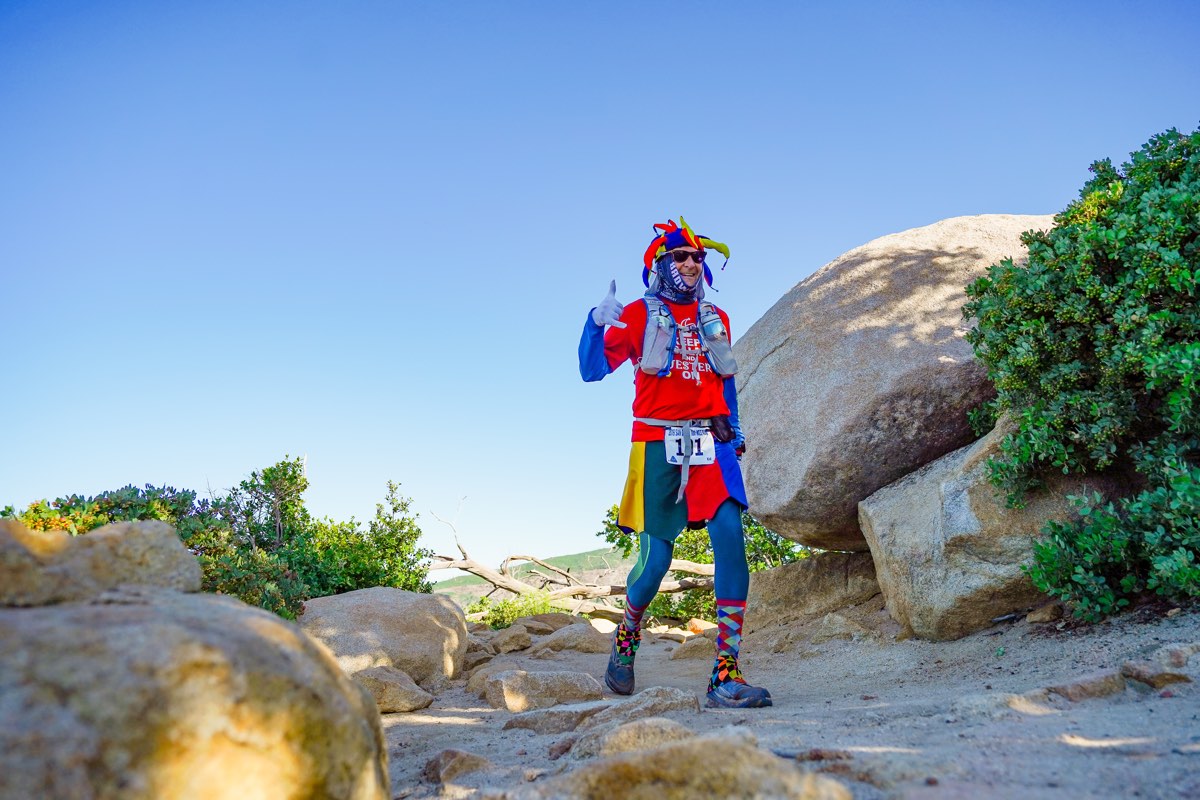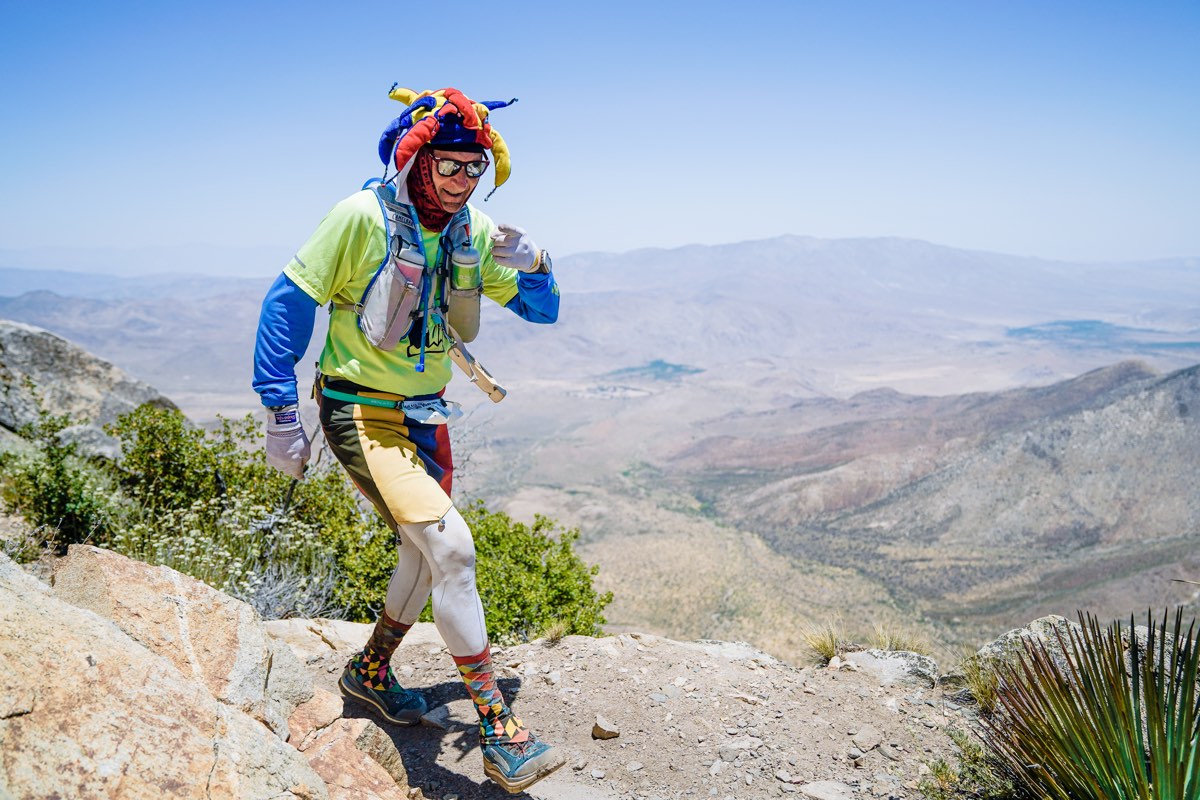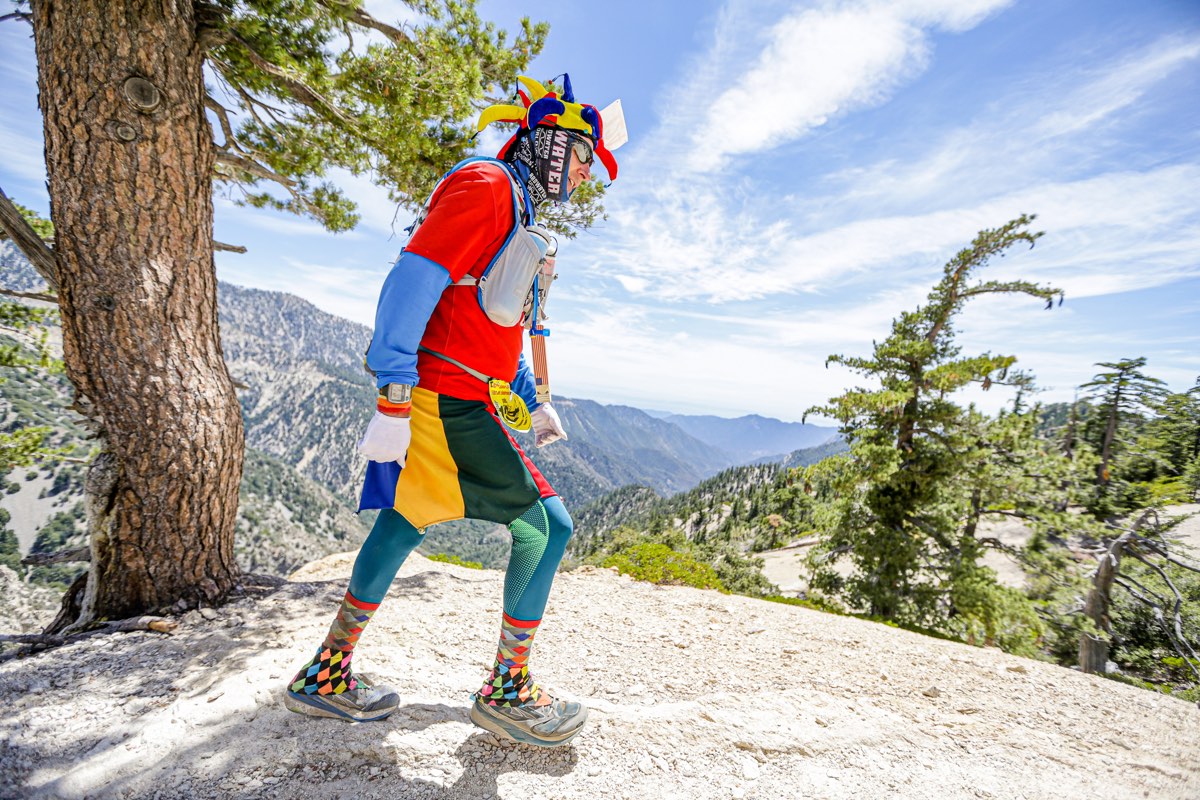“Age-Old Runners” is an article series where we explore runners’ performance potential after the age of 45 by interviewing excellent middle-aged runners. Is there still potential to improve? What roles do motivation, mindset, and specific training and recovery techniques play in allowing runners in their mid-40s to mid-60s to continue to excel? To learn more about this series’ goals, check out its introductory article.
Ed Ettinghausen will be 58 years old this month. He ran a few marathons when he was in high school, but didn’t really run again until 2009 when he was 46. Then he got busy. In the last 11 years, he’s finished around 234 ultramarathons. Ninety-three of those efforts have been 100 milers, and most of the rest were longer than that. In 2014 alone, he ran forty one 100-mile races, setting the then record for most 100 milers run in one year. This was a follow-up to running the most marathons in one year in 2011–135 of them!
Ed’s 100-mile PR is 14:50:40, which he set at Desert Solstice when he was 51. He holds the American six-day road record for the 55-59 age group with 455.8 miles (733.6 kilometers), which he set in 2017. He’s also run the Badwater 135 nine times.
The following is a transcript of a phone interview with Ed. It has been edited for brevity and clarity.
Do you think runners over the age of 45 still have potential to improve?
I think too many people put themselves in a box. They say: “Well, I’m this age, so I shouldn’t be doing this. I should be doing something else because I’m too old to do it.” I think that’s limiting. It’s unfortunate. I don’t have that belief system.
When you started running again at age 46, you quickly set audacious goals such as going after the record for most marathons run in a year and the most 100 milers run in a year. Do thoughts about your age limit your running goals in any way?
I probably don’t accomplish 80 to 90% of my goals. I believe in setting a goal as high as you possibly can and not limiting yourself with the word “impossible.”
On running his first 100 miler at his first ultramarathon in 2009.
I had just gotten back into running after 28 years. I had run a couple of marathons, and then I heard about this 24-hour race that went around this one-mile circle…. It was the Nanny Goat. Some people I was talking to encouraged me to do it. I showed up, and I saw these cars that had Western States 100 stickers and all these other 100-mile stickers. I was totally intimidated, and I felt totally out of place. I was just a little marathon guy, and I only had done a couple of those. But I got out there, did the race, and ended up finishing with 102 miles. I went beyond what I thought I could do. I mean, in the back of my mind, I thought maybe I could run 100 miles, but I had never even done a 50k.
So it never enters your mind that you shouldn’t aim for a particular goal because maybe your body isn’t up to it anymore?
No, that does not enter my mind at this point. I’m sure it will…. The way I look at it is: I didn’t really start running until 11 years ago…. I’m only 11 years into my running right now, so I’ve got lots of good years left in my body. I haven’t beat it up all that much.
Can you still PR in a 100-mile race?
I have this thought in the back of my head that yes, I could. My [100-mile] PR is 14:50, so that’s a pretty fast hundred miles. But I did it when I was 51… and I never really put the right amount of effort into my training. So if I got totally serious and said: “Okay, I’m going to go all out and see what I’m capable of doing.” And if I got a running coach that would keep me on track and set up a good training plan, I think it’s possible.
I’m always going to think that because the day I say: “Nope, it’s not possible,” is the day that I sort of give up…. I’m not going to say I can’t do a PR. In fact, I have that goal [for the marathon.] My marathon PR is 3:01:18, and that’s from when I was 18 [years old.] That was the Napa Valley Marathon…. Well [2021], that’s exactly 40 years after I PRed at that marathon. And I thought, How cool would it be if I went back to that marathon and got a sub-three-hour 40 years later? That would be pretty cool! I think it’s possible. There are guys who are older than me that are doing sub-three-hour [marathons], and there are even a couple who are doing sub-2:50s, so it’s not like it’s impossible. If someone else has done it, then it’s possible. And if someone else hasn’t done it, that just means it hasn’t been done yet.
Has your desire to race decreased any over the past 11 years and 234 ultras?
It has an ebb and flow to it. There are certain times when I’m gung ho to just race, race, race as much as I can…. But there are other times when I … just don’t have the same motivation level…. It’s always there, [but] sometimes it’s less than it is other times.
Why do you think people stop racing as they age?
I think there’s a lot that happens. Life changes occur, family changes, business changes… It could be like: “Okay, I’ve been doing this for a while, and I’ve kind of seen everything I want to see, and I’ve accomplished everything I want to accomplish. And now, I’m ready to move on and try something else….” Maybe, at some point, that will happen to me as well.
Has your reason for racing changed over these past 11 years?
You know, when I first started racing, I just wanted to see if I was capable. And then, once I determined I was capable, then I wanted to see how much harder I could push…. My motivation to race comes from the internal drive I have. It’s insatiable. I just always want to run more and race more.
But a big part of [why I race now] is also that I have a lot of people who follow what I do, and they are inspired by what I do. I feel like I need to demonstrate that this is what one body is capable of doing…. I don’t have any special skills or talents. I tell people that all the time. If you want to do what I have done, or what I do, just do what I do. Just go out and race all the time. You know, as soon as I broke the record for most 100 milers run in a year [in 2014], I knew it was something other people could do…. And, sure enough, Walter Handloser … saw me at an event, and we chatted, and I told him, “You can do this,” and sure enough he did. He ran fifty 100 milers in 2019.
Do you ever think about your age during a race?
Honestly, my age never enters my mind. I do think about whether someone is in better shape than I am. The only time I think about age is if I’m in a race where there’s an age division that I might be able to break a record in.
Are age-group records as exciting as an overall win?
No, I do an age-group record because it’s there and it’s available…. Now, I don’t own any world age-group records, so maybe that would be different…. I mean, if the record is there, I’ll go for it for sure, but I like winning. I like being first overall, not first of the old farts.
Adequate recovery seems key to running well as you age. You often race every weekend. How do you view recovery? What is your approach?
I learned that the number-one rule in racing 100 milers is staying healthy. This is the bottom line no matter what…. I’m really, really very aware of my body, and if I feel something come on, I will just shut it down…. I’ll start powerwalking until I heal up. I just had that happen recently. I had a knee issue. I was doing a number of virtual events, and I was trying to really push my miles. I had a couple of weeks where I had over 200 miles a week. The knee thing was starting to come on, so, for a while there, I was just powerwalking. I was still getting in some decent miles, but I was just listening to my body and paying attention. And it turned around. And, now, I’m back to running some big miles, and it’s completely gone.
Typically though, I don’t have a set plan for recovery. One thing I have learned is that it’s really important to go out the next day and do something…. I typically powerwalk. So for me, Mondays are powerwalk days. That’s almost sacrosanct…. Getting out there and doing three or four or five miles–even slow, easy walking miles–is really important for recovery…. It gets the muscles moving. It gets the blood flowing. It gets everything working. And you get a chance to see if there’s anything you’re not aware of. If I’m out doing a walk, I might start to feel something that happened in the race that I didn’t realize was there…. After that, it’s just being real gentle in getting back into the swing of things. Take your time. Don’t be in any rush. When I was doing 100 milers just about every weekend, I would pretty much take the whole week off from running. My running would just be weekends. So again, I don’t have a formal plan. I go by what kind of feels right.
Do you do strength training to help prevent injuries?
No. I’m a one-sport kind of guy. I run, and I powerwalk, and that’s just pretty much it.
Do you stretch or use a foam roller?
No, I do zero stretching. I do zero rolling. That’s not to say those aren’t good things to do. I just don’t do them. I don’t like stretching. It takes time, and I just don’t want to do it, so I don’t. And luckily for me, I rarely get injured. So if I don’t enjoy it, and it’s not necessary for me to keep myself healthy, I just don’t see the need for me to do it.
Besides listening to your body, to what do you attribute your health and lack of injury?
I’m pretty good with my diet. I try to be aware of that, and I have lived a healthy lifestyle my whole life. I’ve never had any alcohol my whole life, and I’ve tried to put the right foods into my body as much as possible. I do have a sweet tooth, so I’m not the perfect example.
Also, I really think so much of what our body does is what we program it to do mentally. I think that we can prevent ourselves from having injuries by the right mental processes. I truly believe that we do have that control…. The word “pain” has a negative connotation to it. It’s not knee “pain,” it’s a knee “signal.” Just changing the phraseology of how we talk about things and how we focus on them makes a big difference. I believe that’s part of why I rarely get injured…. Injury knows not to approach me because I don’t entertain injury.
How did you come to this way of thinking about injury and mindset?
It’s just something that’s evolved over the years…. I’m a student of psychology, so I watch what happens [during 100-mile races.] When people have a negative attitude, I see how much that affects every aspect of their abilities in a race.… I have this theory that when I’m out there as the Jester, I can change people’s mindsets. It’s pretty easy to do because I’m this guy running around in this crazy jester outfit with a cowbell, high fiving and giving words of encouragement. I see how much of an effect it all has.
But I’ve also seen people that nothing is going to get to…. And the sad thing is, most of it is in their heads. We look for something we can blame things on because we don’t want to say we’re giving up…. We’ll blame it on some issue with the body instead…. I’m the first one to say you should stop if there’s truly something going on that’s not safe, but many times, that’s not the case. It’s more of a mental thing, and people don’t want to admit that, or they just don’t realize it.
Because I’ve seen how that process works with others, I’ve incorporated it into my own mental well-being when I’m out on the run…. Some things are chemicals and wiring, but some things actually are within your control. So that’s what I focus on.
Do you incorporate speedwork into your training?
Not really. But if I really wanted to focus on finally doing the best I possibly could do, I would probably hire a running coach. I would need a really good coach who was willing to say, “Okay, Ed, you’re 57, but if you believe you can set records at this age, I’m with you…. You’re going to work harder than you’ve ever worked in your life, but we’re going to see what you’re capable of.” I would do it.
But as far as am I doing that now? No, I don’t have a formal speed-training plan. I do fartlek training and maybe one-mile splits here and there… I just kind of go by how I feel and by the seat of my pants. Even when I set a distance goal for the day, many times I’ll run more. Sometimes I’ll run less. It’s all just by feel.
How much sleep do you get nightly when you’re not racing?
It varies. Right now, I’m probably at about four to five hours of sleep a night. But there are times when I’m getting eight. And I’ll tell you quite honestly, I don’t even set an alarm. When I wake up, I wake up.
What mistakes do you see new ultrarunners making?
One of the biggest mistakes I’ve seen people make is limiting themselves on what they’re capable of doing. Even the records I’ve set, I could have done more. I ran forty one 100 milers because Liz Bauer had run 36. But if Liz had run 44, I would have run 45 or 46. Too many times, we limit ourselves.
The opposite side of that coin is that we’re also too hard on ourselves. We set a goal, and if we don’t make it, we beat ourselves up. So it goes both ways: Don’t set limits on your potential, but don’t beat yourself up either. Just learn from it, and go out and try again, and keep trying. Have fun with the process…. I can set a crazy goal… and if I don’t reach it, I’m okay with that. We should be like kids out there enjoying running through a puddle.
Every DNF I’ve had, I wish I didn’t have it, but there’s something of value there. It’s the ultra gods saying: “Look, here’s your weak link. You need to work on this if you want to be a strong runner.”
On reaching out and talking to other ultrarunners.
I wish I would have reached out earlier in my running career and talked to other 100-mile runners. I thought they wouldn’t want to talk to me because I wasn’t at their level. When I did my first ultra, I was intimidated. I was really afraid to talk to these other people who I was in awe of. And then, when I got to know the 100-mile community, [I realized] we all started out in the same place. We’re all here to help each other. It’s such a friendly, warm, and inviting community and atmosphere. That’s part of why I go out as a jester. If you see some crazy guy dressed up in a jester outfit… well, geez, if you can’t talk to that guy, then who can you talk to? I would encourage runners who are just starting out to talk to other 100-mile runners. They will help you.
On the usefulness of helping others during a race.
One of things that helps me the most when I’m in a race and I’m having a tough time, is finding someone else who is struggling more. Then it’s my goal to help them. Maybe all they want to do is get to the next aid station. That becomes my overriding goal, to help get them there. I don’t think about myself anymore, and, before you know it, I start feeling really good because I’m helping somebody. With volunteerism, you always get more than you give. I would encourage people to reach out more, and to help other people more, and, also, when you need help, to ask for it.
Training specifics:
- Weekly running volume: Seventy to 120 miles a week
- Strength training: None
- Off-season: No
- Sleep: Averages four to eight hours a night
- Race nutrition: Eats and drinks what looks good at aid stations
- Recovery: Walks the day after a race and walks daily until running feels good again
Three factors Ed attributes his running performance to:
- Jester costume
- Attitude of gratitude
- Helping others in their ultra journey



